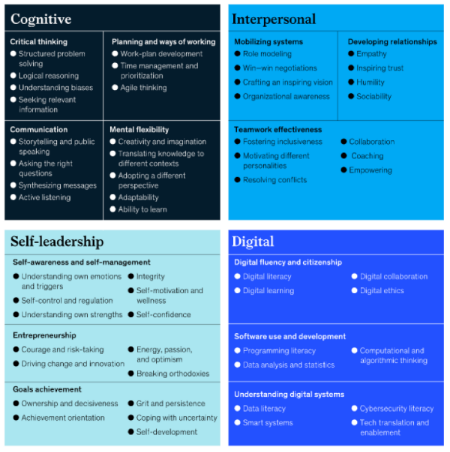Mad Skills: Intentional Learning in Chaotic Times
- Jamie Maniloff

- Feb 26, 2022
- 3 min read
Updated: Feb 28, 2022
As we round out year two of the pandemic, people everywhere seem to be examining the relationship between their work and their lives. With trending terms like The Great Resignation and more recently The Great Renegotiation, it’s easy to focus on how organizations are getting it wrong. But what about the efforts made toward getting it right?
There has been, and continues to be a significant push around upskilling and reskilling in companies large and small, to help with professional growth and employee retention. While there are plenty of programs and courses available on traditional “hard skills” (certificate in Power BI, anyone?), more and more education is being offered on “soft skills” which, as best-selling author Simon Sinek points out, are actually not soft at all. They’re human skills – like how to effectively navigate confrontation, and how to create and maintain a growth mindset.
When it comes to upskilling and reskilling, a growth mindset is essential. The world is in constant flux, especially lately, and we have to remain agile and willing to learn new things if we want a shot at keeping up. The good news is that we can actually learn to perform brilliantly when conditions of uncertainty are at their peak. According to McKinsey, great problem solvers are made (not born) by learning to adopt an open and curious mindset, and by practicing tolerance for ambiguity.
A growth mindset and active curiosity are the fuel of intentional learning – a style of learning centered on getting more out of the moments that make up our days. It’s about viewing every task, every interaction, and every outcome as an opportunity to learn and grow. Intentional learning goes hand-in-hand with upskilling and reskilling. If you’re not clear on why you’re learning something new, or learning a different method or tactic around something you already know, it’s unlikely that you’ll be able to retain or effectively implement your learnings.
Intentional learners are anchored in clear, tangible goals, so they can use curiosity as an effective tool instead of having it be a source of distraction. They also practice deliberately in areas they want to grow in to create expertise. Deliberate practice, according to Swedish Psychologist K. Anders Ericsson, is defined as focused activity aimed at just the right level of challenge to extend expertise. In other words, when it comes to upskilling and reskilling, it’s important to be intentional about what you’re learning and also how your learnings stack up against your current set of skills.
The pandemic has only heightened the urgency of upskilling and reskilling, and many companies are getting keen to the idea that these types of skill building should focus on social and emotional skills. In fact, results from a recent McKinsey study revealed that the most important skills to develop tend to be social and emotional in nature (for example, empathy, leadership, and adaptability). Their research identified 56 foundational skills that will help people thrive in the future of work.
Not to get too meta, but it’s important to remember that learning itself is a skill, and developing it is a fundamental driver of long-term professional success. People who work on creating and maintaining a growth mindset, foster curiosity, and learn intentionally can reap higher benefits from the opportunities that come their way – benefits that that will serve them in both their professional and personal lives.











Comments